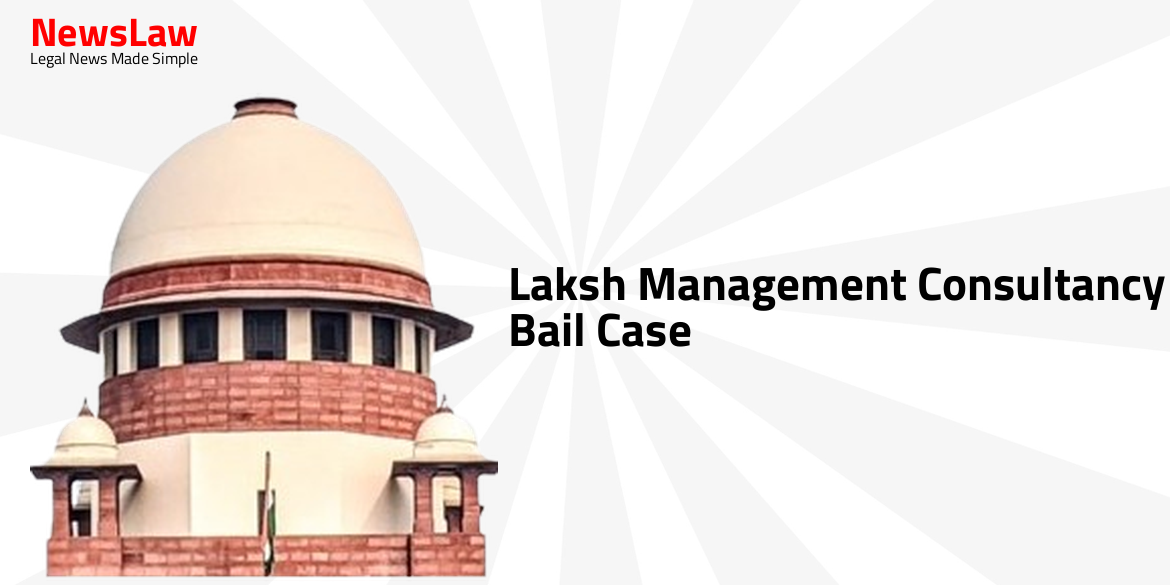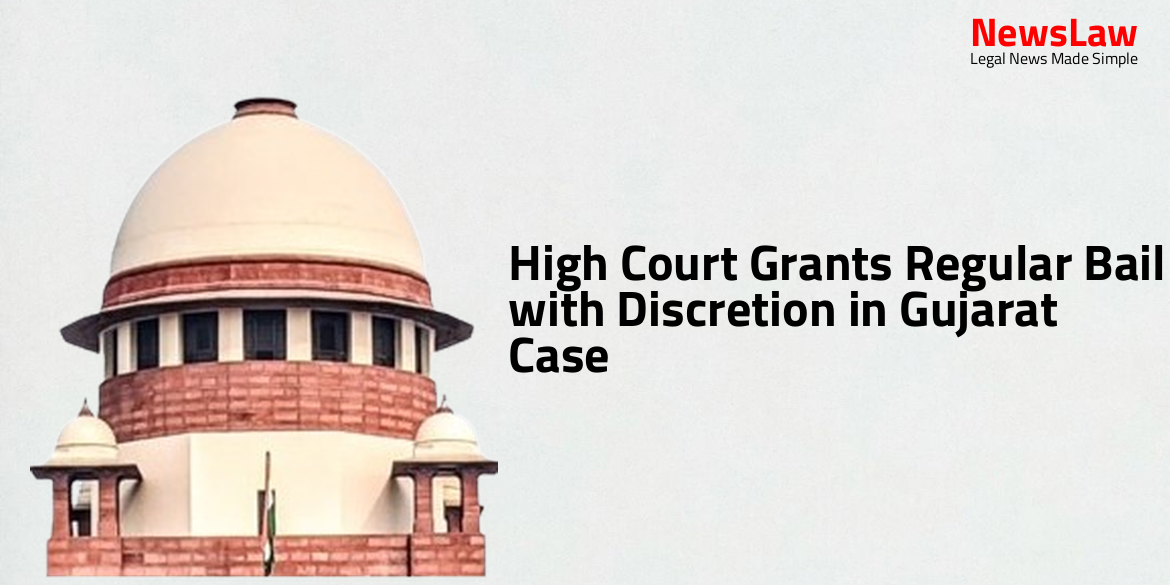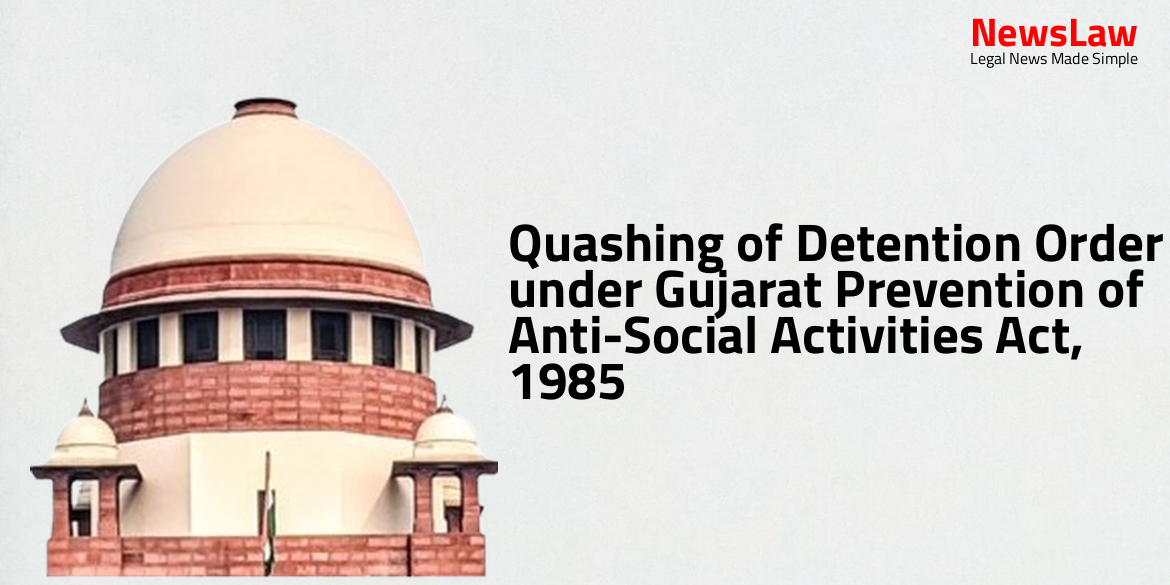In a significant ruling by the Gujarat High Court, a detention order under the Gujarat Prevention of Anti-Social Activities Act has been quashed, ensuring the preservation of personal liberty. The case sheds light on the distinction between law and order versus public order, emphasizing the need for careful scrutiny of preventive detention orders. This victory reaffirms the fundamental principles of justice in the case involving the state and the detained individual.
Facts
- Present petition challenges the order of detention dated 06.01.2024 passed by the detaining authority under the Gujarat Prevention of Anti-Social Activities Act, 1985.
- The detaining authority detained the petitioner under Section 3(1) of the Act.
- The petitioner is defined as a detenue under Section 2(c) of the Act.
Arguments
- The advocate for the petitioner argues that the detention order is solely based on the registration of two FIRs, which do not qualify the petitioner as a threat to public order as defined in the Act.
- It is emphasized that the activities of the petitioner, related to criminal cases, have not disrupted the social fabric or posed a threat to the normal functioning of society.
- Furthermore, the fact that the petitioner was released on bail in all offenses is highlighted as a point of consideration.
- The advocate asserts that the alleged illegal activities do not directly impact public order but may constitute a breach of law and order.
- There is a plea to quash the detention order as it lacks sufficient legal basis to classify the petitioner as falling under Section 2(c) of the Act.
Analysis
- A mere apprehension of a breach of law and order is not sufficient to meet the standard of adversely affecting the ‘maintenance of public order’.
- The power of preventive detention should be exercised with caution and proper appreciation of facts to determine if acts are prejudicial to the interest, security of the State, or disturb public law and order.
- Not every disturbance of law and order constitutes public disorder; only disturbances that subvert public order do.
- The distinction between disturbance to ‘law and order’ and disturbance to ‘public order’ has been clearly settled by previous court rulings.
- In cases of detention, personal liberty should not be sacrificed on the grounds of preventive detention if the person is implicated in a criminal proceeding.
- The exceptional powers of preventive detention must be exercised according to lawful standards and with fairness.
- The contravention of law must affect the community or the public at large to be considered a disturbance to public order rather than just law and order.
- Preventive detention should not be used as a remedy if recourse to ordinary law can be effective in preventing prejudicial activities.
- The expression ‘public order’ does not encompass every kind of disorder but those that affect the community at large.
- The case emphasizes the need for careful scrutiny of preventive detention orders, especially when based on charges being tried in criminal court.
- Preventive detention should not be used as a means to keep a person in perpetual custody without trial.
- Preventive detention is meant to prevent a person from committing specific offenses, not to replace ordinary laws or investigative processes.
- The freedom of individuals is paramount and should only be restricted when absolutely necessary for public order.
- The hierarchy of legal concerns starts with law and order, followed by public order, and finally the security of the State.
- Acts may impact law and order without affecting public order, and may affect public order without threatening the security of the State.
- Punishments for offenses should be administered under relevant laws, rather than resorting to preventive detention.
- Preventive detention is a tool to avoid future offenses, not a mechanism to bypass standard legal procedures.
- Article 22 must be read as an exception to Article 21
- Exception under Article 22 applies only in rare and exceptional cases
- Simplicitor registration of FIR/s does not have a nexus with breach of public order
- No relevant material exists for invoking power under Section 3(1) of the Act
- Personal liberty under Article 21 is sacrosanct and high in constitutional values
- Detaining authority must show detention accords with procedure established by law
Decision
- The petitioner-detainee is ordered to be set at liberty forthwith if not required in any other case.
- Direct service is permitted.
- The present petition is allowed.
- The impugned order of detention dated 06.01.2024 is quashed and set aside.
Case Title: SUBODH S/O DHARMENDRA RAMANI THROUGH DHARMENDRABHAI RAKHANABHAI RAMANI Vs. THE STATE OF GUJARAT
Case Number: R/SCA/1657/2024



